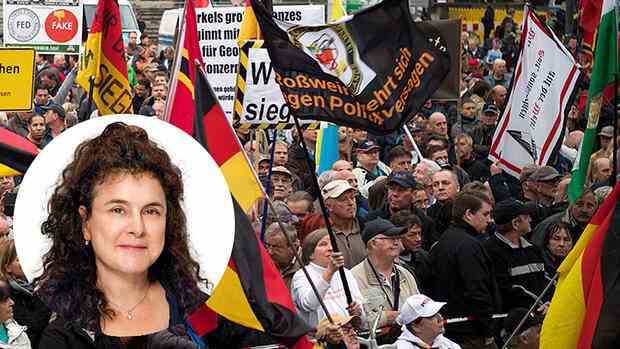Dalia Marin teaches international economics at the TUM School of Management at the Technical University of Munich and is a senior fellow at the European think tank Bruegel in Brussels.
(Photo: dpa, private)
The recent elections in Sweden and Italy show that right-wing populism is still on the rise in Europe. In Germany, on the other hand, the successes of the Alternative for Germany (AfD) remain limited. In the territory of the old Federal Republic, resilience against them is comparatively strong, but in East Germany the opposite is the case. How is the discrepancy explained? More generally, what do globalization and right-wing populism have to do with each other?
Before the AfD appeared on the political scene in 2013 as an anti-euro and anti-Greece bail-out party, there was no successful right-wing populist movement in Germany. In contrast to other rich industrialized countries, globalization played only a subordinate role in the rise of right-wing populism – after all, the share of trade in gross domestic product has not increased since the global financial crisis of 2008. Consequently, the AfD quickly shifted its focus to alleged dangers of foreign infiltration and called for immigration to be stopped.
In East Germany in particular, it could or can win about every fourth voter, in the old Federal Republic, on the other hand, only around every eighth. The root of this glaring difference lies in the monetary union of 1990, when the West German government liberalized trade with East Germany overnight. The GDR mark was mostly converted into D-marks on a one-to-one basis, raising wages in the East to 70 percent of West German levels, even though East German productivity was only 30 percent of West Germany. The consequence: the East German manufacturing industry went bankrupt overnight, which, in addition to mass unemployment, also triggered an erosion of East German self-esteem.
East Germany’s closed economy
Globalization played no role in the AfD’s upswing in the East. After the fall of the Wall in 1989, East Germany initially turned into a closed economy, largely cut off from international trade, with negligible immigration. Studies show that, paradoxically, low immigration can fuel xenophobia. Even today, the proportion of foreigners in eastern Germany is significantly lower than in western Germany. This provincialism provides fertile ground for the extreme right.
Top jobs of the day
Find the best jobs now and
be notified by email.
Unlike in Germany, the success of right-wing populism in Europe and Trumpism in the USA can be explained primarily by globalization effects. The “China shock”, for example – the People’s Republic was admitted to the World Trade Organization in 2001 – led to job losses and falling real wages, especially in the manufacturing sector in the USA. Domestic manufacturers there were and are much more exposed to Chinese import competition than is the case in Germany. In the USA, for example, import competition increased by 25 percentage points between 2000 and 2010, while in Germany it was only 14 percentage points.
In addition, Germany was able to compensate for the effect of rising Chinese imports with increased exports to the People’s Republic. German exports to China have almost tripled since the global financial crisis, no other country can boast such an increase. The Chinese love German product quality. In addition, textiles, for example, are well represented in German imports from China, i.e. goods that were previously imported from other cheap markets. Jobs were lost in countries such as Greece and Turkey in particular, which gave the right-wing populist forces a strong boost there.
Hard times for the AfD?
Even in Germany, not everyone has benefited from globalization. Employers’ threats to relocate production to Eastern Europe weakened union bargaining power, leading to a 30 percent drop in unit labor costs between 1995 and 2012. No other European country recorded such a decline.
Globalization has been in retreat since the pandemic and the Ukraine war. Companies in Germany and Europe are reacting to the increased uncertainty by relocating and diversifying production. Europe’s diversification strategy, supported by the public sector, opens up the opportunity for the eastern German region to also reindustrialize and develop into a powerhouse for green technology. Instead of resentful provincialism, this could open up forward-looking perspectives. The AfD would then probably face difficult times.
The author: Dalia Marin teaches international economics at the TUM School of Management at the Technical University of Munich and is a senior fellow at the European think tank Bruegel in Brussels.
More: The stoppable rise of the right-wing populists.
